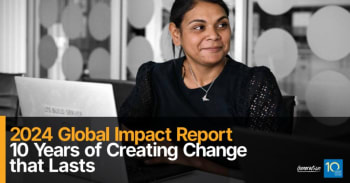Generation at 10 years: 137,000 lives, $1.9 billion in wages, 17 countries

To mark this milestone, our 2024 Annual Impact Report showcases the change Generation is creating for both today and generations to come.
A widowed mother with three young children who is able to send her children to a good school. A Kenyan man living in poverty but now owns his own business. A midcareer worker with minimal tech experience who successfully transitioned into a new industry. These are just a few of the more than 137,000 individuals who have graduated in the last ten years from Generation, a global nonprofit helping people build sustainable livelihoods and unlock long-term economic mobility. Together they have earned more than $1.9 billion in life-changing wages.
Through accelerated training, placement, and support into specific professions in tech, sustainability, healthcare, skilled trades, and customer service, Generation offers learners more than skills for today’s job market. It provides a pathway to lifelong transformation for individuals, their families, and their communities. The result is change that reaches far beyond a single paycheck or position.
A proven methodology
Over the past decade, Generation has honed its approach to driving system change and implementing specific programs. Eighty-three percent of Generation graduates are placed in jobs within 6 months of graduation. And the change lasts: 76 percent of Generation graduates remain employed two-to five years after graduation, 56 percent earn a living wage, and 89 percent of them work in roles directly tied to their training. As showcased in our recently-released 2024 Annual Impact Report, that durability is the result of a deeply integrated approach—one that starts with employer demand and continues long after learners graduate.
“As we mark our 10-year anniversary, we do so in a world navigating multiple trends – from geopolitical tensions and economic volatility to rapid labor market shifts brought forth by the latest advancements in AI and robotics. Throughout, we are reminded that what we are working towards is change that lasts.” Mona Mourshed, Global Generation CEO.
Generation employment programs combine technical training with behavioral and mindset development, ensuring learners are prepared to enter and stay in jobs for the long term. Learners spend 70 percent of their time in hands-on practice that includes programming labs where they solve different types of realistic work problems with coding, or use of other tech tools and platforms. An example of this type of hands-on practice is our Skills Application Challenge, where teams of 4-5 learners simulate a single workplace scenario using Agile and SCRUM principles over the course of three weeks.
Over the course of six to sixteen weeks, students master both job tasks and how to show up with resilience, professionalism, and a growth mindset. Well before they graduate, they are connected with employers who are interviewing for open roles —most begin work rapidly.
Completing the program is just the beginning. Every graduate becomes part of the Generation alumni community, a robust support network, and has the support of mentors as they navigate starting their first jobs. When challenges come up, Generation is there. One graduate from Mexico who struggled to find stable employment in nutrition was able to make the switch into a better-paying job in a separate field. The upskilling and employer access Generation provided enabled her to pursue a career change she never dreamed possible.
New world, new skills
For most learners, Generation marks a turning point. More than 90 percent are unemployed when they enter, and nearly one-third have dependents to care for. Their success lifts entire households. Take the young, widowed mother: before Generation, her focus was making sure her children didn’t go to bed hungry. Today, she’s providing them with stability, education, and a future once seemingly out of reach. The Kenyan man can pay rent for his mother, support his siblings’ education, and begin saving to continue his university education. These individual transformations are powerful on their own, but they’re also increasingly essential in the face of a rapidly evolving labor market. As automation and AI shift the nature of work in unprecedented ways, companies are already naming upskilling as a key lever to maintaining competitiveness, adapting to new technologies, and unlocking value from AI investments.
According to the World Economic Forum, workers can expect that 39 percent of their current skills will be transformed or become obsolete between 2025 and 2030. In Europe alone, up to 12 million occupational transitions may be required by 2030, twice the pre-pandemic pace.
Individual and systemic impact
Upskilling has implications for both individuals and societies at large. A recent McKinsey survey found that more than one in four business leaders believe that failing to close critical skills gaps will erode financial performance and limit returns on AI investment. And while much attention has been paid to early-career talent, an enormous opportunity remains underleveraged: the midcareer workforce. Often overlooked and excluded from upskilling programs, this population represents a $6.2 trillion opportunity in annual GDP.
At Generation, we are meeting this moment by doubling down on what we know works– investing in the durability of our outcomes and helping others do the same. Most recently, we helped launch The Durability Collective as an inaugural member. The Collective is a global community of funders, practitioners, and other stakeholders committed to building a stronger shared capability for measuring what truly lasts in social impact.
Generation has shown that a new workforce model is possible—one that delivers both business value and lasting change. In 2024, 76 percent of our employed graduates were hired by repeat employers, up from 65 percent in 2023. This signals more than employer satisfaction. It’s evidence of quality, trust, and consistency—proof that Generation graduates deliver value time and again. This is the kind of transformation that ripples outward. From individual stability to family security. From business performance to societal resilience. From short-term job placement to long-term economic mobility. Durable change, at scale.
